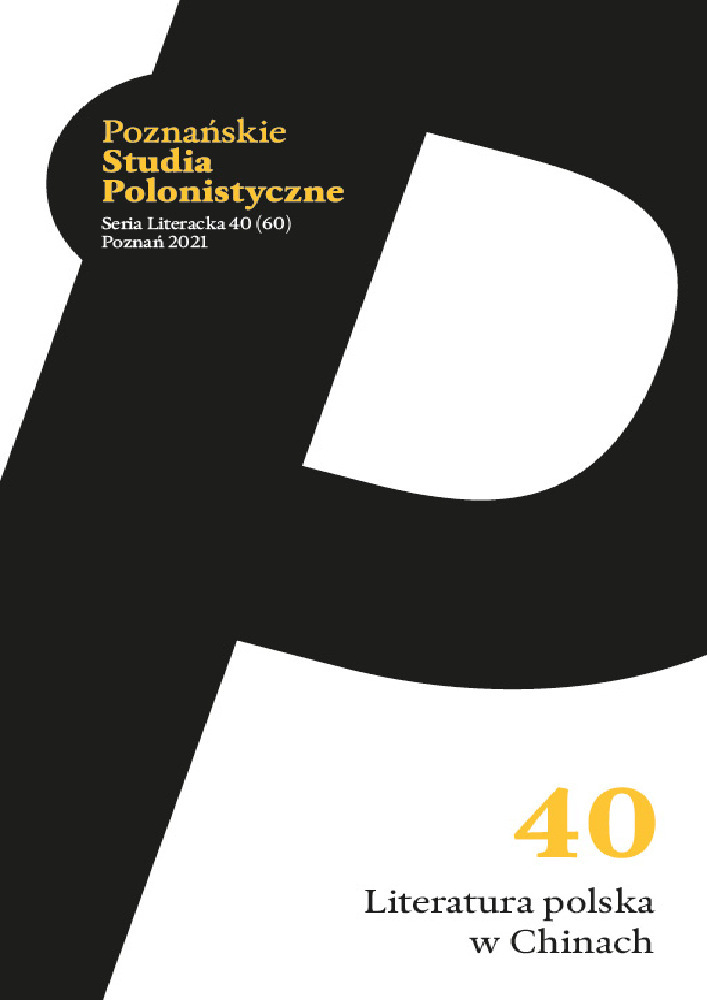Abstract
This paper is devoted to the reception of Jerzy Grotowski’s ideas of theatre and actors’ training system in China and Taiwan at the end of the twentieth century. The author analyses the scope of Grotowski’s influence on Chinese and Taiwanese theatre reformers, stage directors and actors/dancers at a specific moment of deep social, cultural and political transformations in Asia. She also tries to determine the main reasons for Grotowski’s popularity in mainland China and Taiwan in the 80s and 90s.
References
Dai Ping (1985), Pinkun xiju ji qi yu xiqu zhi bijiao [Teatr ubogi a chiński teatr tradycyjny], „Xiju Yishu”, nr 4, s. 61-68.
Gao Xingjian (1988), Dui yizhong xiandai xiju de zhuiqiu [W poszukiwaniu nowoczesnego teatru], Zhongguo Xiju Chubanshe, Beijing.
Gao Xingjian (1990), Playwright’s Preface, przeł. Bruno Roubicek, „Asian Theatre Journal”, t. 7, nr 2, s. 192-193.
Gao Xingjian (1996), Meiyou zhuyi [Bez -izmów], Cosmos Books Ltd, Xianggang.
Grotowski Jerzy (1968), Towards a Poor Theatre, Odin Teatrets Forlag, Holstebro.
Grotowski Jerzy (1990), Teksty z lat 1965-1969. Wybór, red. Janusz Degler, Zbigniew Osiński, „Wiedza o kulturze”, Wrocław.
Liu Jingmin (1992), Zhongguoren de shenti yu xiju xin xingtai de tansuo – fang Liu Jingmin tan You Juchang [Chińskie ciało i poszukiwanie nowej formy teatru – rozmowa z Liu Jingmin o You Juchang], „Minzhong Ribao”, 30 listopada.
Liu Jingmin (1996), Taiwan juchang meiyou shenti? [Tajwański teatr nie posiada ciała?], „Biaoyan Yishu, nr 5, s. 61-64.
Łabędzka Izabella (2008), Gao Xingjian’s Idea of Theatre. From the Word to the Image, Brill Academic Publishers, Leiden–Boston.
Łabędzka Izabella (2020), Cud ucieleśnionych metamorfoz. Tajwański teatr tańca i ruchu, Wydawnictwo Naukowe UAM, Poznań.
Osiński Zbigniew (1980), Grotowski i jego Laboratorium, PIW, Warszawa.
Quintero Craig Anthony (2000), Performing Culture / Cultural Performances: The Little Theatre Movement of Taiwan, Evanston, Northwestern University, [rozprawa doktorska].
Quintero Craig Anthony (2002), Pilgrimage as a Pedagogical Practice in Contemporary Taiwanese Theatre. U-Theatre and the Baishatun Ma-tsu Pilgrimage, „The Drama Review”, t. 173, s. 131-148.
Ruoyu Liu (2018), Liu Ruoyu de sanshiliutang biaoyanke [Trzydzieści sześć lekcji Liu Ruoyu o przedstawianiu], Tianxia Wenhua Shufang, Taibei.
Salter Denis (1996), China’s Theatre of Dissent: A Conversation with Mou Sen and Wu Wenguang, „Asian Theatre Journal”, t. 13, nr 2, s. 218-228.
Sun William Huizhu, Fei Faye Chunfang (1986), „The Old B Hanging on the Wall” in the Changing Chinese Theatre, „The Drama Review”, t. 112, nr 4, s. 84-105.
Ścisły program badawczy „Dramat Obiektywny” prowadzony przez Jerzego Grotowskiego. Prospekt (2000), przeł. Grzegorz Ziółkowski, „Pamiętnik Teatralny”, t. 193-194, z. 1-4, s. 403-416.
Winterbottom Philip Jr. (2000), Dziennik (wybór), przeł. Olga A. Marcinkiewicz, Grzegorz Janikowski, „Pamiętnik Teatralny”, t. 193-194, z. 1-4, s. 461-515.
Zhong Mingde (1992), The Little Theatre Movement in Taiwan (1980-1989). In Search of Alternative Aesthetics and Politics, New York, New York University, [rozprawa doktorska].
License
Authors
Authors of texts accepted for publication in „Poznańskie Studia Polonistyczne. Seria Literacka” are required to complete, sign and return to the editor's office the Agreement for granting a royalty-free license to works with a commitment to grant a CC sub-license.
Under the agreement, the authors of texts published in „Poznańskie Studia Polonistyczne. Seria Literacka” grant the Adam Mickiewicz University in Poznań a non-exclusive, royalty-free license and authorize the use of Attribution-NoDerivatives 4.0 International (CC BY-ND 4.0)Creative Commons sub-license.
The authors retain the right to continue the free disposal of the work.
Users
Interested Internet users are entitled to use works published in „Poznańskie Studia Polonistyczne. Seria Literacka” since 2016, for non-commercial purposes only, under the following conditions:
- attribution - obligation to provide, together with the distributed work, information about the authorship, title, source (link to the original work, DOI) and the license itself.
- no derivatives - the work must be preserved in its original form, without the author's consent it is not possible to distribute the modified work, such as translations, publications, etc.
Copyrights are reserved for all texts published before 2016.
Miscellaneous
Adam Mickiewicz University in Poznań retains the right to magazines as a whole (layout, graphic form, title, cover design, logo etc.).
